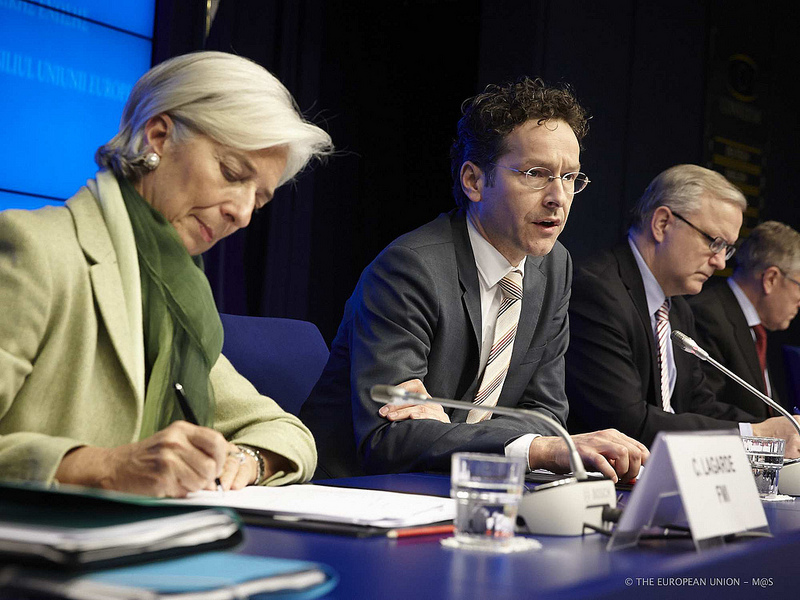
At the Spring European Council on 14/15 March 2013 the perennial issue of economic growth and jobs once again took centre stage. The President of the European Commission, José Manuel Barroso, stated on Twitter that “Things are better than one year ago, but growth still worrying and unemployment unacceptable.” Mr Barroso is not the only top European politician who highlights the dire social situation in the crisis-ridden countries. In the margins of the European Council Jean-Claude Juncker, the Prime Minister of Luxembourg, warned of a “social revolution” that might result from the harsh austerity measures in Southern Europe.
The latest economic figures confirm this view. In 2012 the Gross Domestic Product (GDP) in the Eurozone shrunk by 0.6 per cent and it is expected that positive economic growth in the Euro area will not return before 2014 the earliest. Of particular importance is that several European countries have now been in recession for several years. In Greece alone economic output fell by roughly 20 per cent since the beginning of the crisis. Most worryingly, this is accompanied by unprecedented levels of unemployment, especially among young people (December 2012: Greece: 57.6%; Spain: 55.6%; Portugal: 38.3%; Italy: 36.6%).
In short, the Euro crisis enters its third and probably decisive phase: social and political crisis. The first phase, financial and economic crisis, begun with the breakdown of Lehman Brothers in autumn 2008 and lasted till late 2009. It was characterised by huge bail-outs of banks and a global response – namely close co-ordination among central banks and a G8/G20-led economic stimulus. This, in turn, led to the second and so far central phase: fiscal crisis (late 2009 – early 2013). Sovereign debt in the Eurozone, first and foremost in Greece, Ireland, Portugal, Spain and Italy, skyrocketed as a result of bail-outs, economic stimuli and, at least partially, years of continued fiscal profligacy. What was supposed to be a liquidity crisis soon turned into a full-blown solvency crisis due to the lack of a lender of last resort, or to be more precise: the unwillingness of the European Central Bank (ECB) to fill this void. The latest chapter of the Euro crisis began with the Italian elections in February 2013 and at its heart has the social and political consequences of the first two phases.
The third phase is different in at least three respects:
First and foremost, the latest phase has a different feedback loop than its predecessors. In the first and the second phase markets provided immediate feedback on the credibility and viability of policies. Frequently policy-makers changed their course of action after a negative market response, particularly when the solvency of one of the member states was at stake. Of course, from a normative point of view, it is debatable whether policy-makers should let markets determine their policies but at the very least there was a clear established mechanism that provided swift feedback. This is different for the social and political dimension. Feedback happens usually through elections which occur only after four or five years. Of course, citizens can make themselves heard with manifestations or strikes but the sharpest democratic sword remains the election. This implies that governments will adapt much slower to new social and political circumstances. By the same token, the current approach to the crisis – tinkering – will no longer work as it heavily relies on constant feedback.
Secondly, interdependency in the third phase is not as strong as it was before. In particular in the second phase – fiscal crisis – interdependency (read: contagion) was one of the main drivers of the crisis management. For instance, Germany feared that a disorderly bankruptcy of Greece could threaten the very existence of the Euro and, hence, damage the German economy. The same logic does not apply to the social and political realities in Greece and elsewhere. The repercussions of social distress, such as a frustrated youth in Spain, are not directly felt in Berlin or Helsinki. Not least Germany’s open blackmail of the Cypriot government demonstrates that the Merkel government, especially in an election year, is not bothered by potentially damaging political consequences in another, crisis-ridden, country. All in all, in the short-term the creditor countries have little incentive to address the social problems in programme countries, let alone to agree on some form of ‘social union’ at the EU-level.
Last but not least, Europe has basically exhausted all of its political tools. In the first phase – financial and economic crisis – EU countries exhausted monetary and fiscal policy. Then, in the second phase – fiscal crisis – Europe’s leaders exhausted nearly all their political capital: in Southern Europe, to convince the public that austerity is the price to pay for the Euro, in Northern Europe, to justify that the Euro is worth saving. The exhaustion of political capital has lead to a systemic dimension: a growing mistrust in the democratic problem-solving capacity of the European Union and its member states. This trend manifests itself in events such as the election results of Beppe Grillo’s 5-star-movement. The latest EU decision to tax depositors in Cyprus will do nothing but enflame this sentiment.







1 Comment